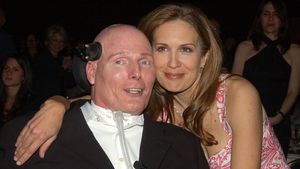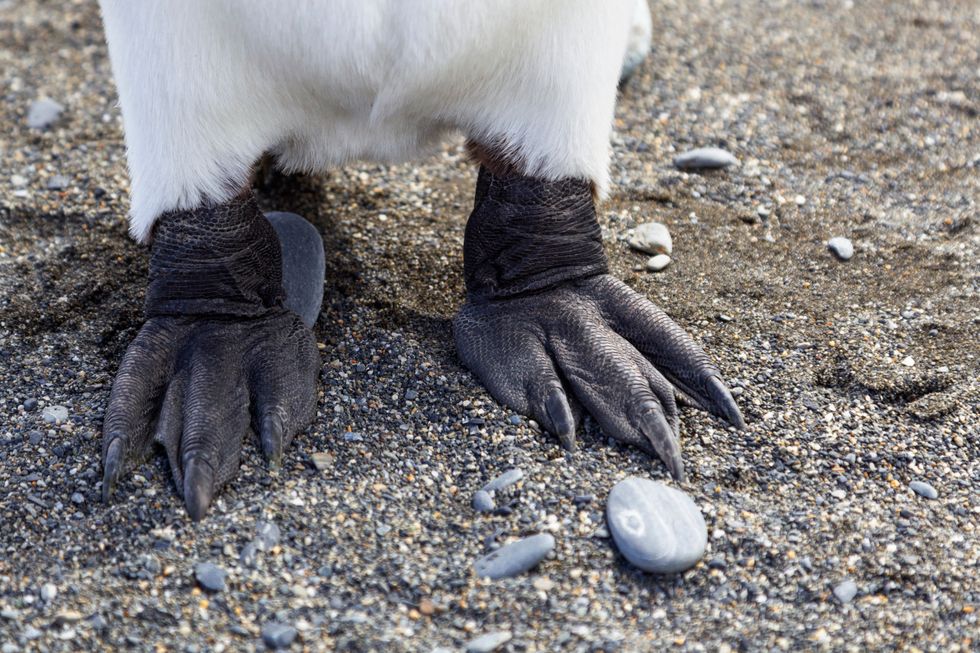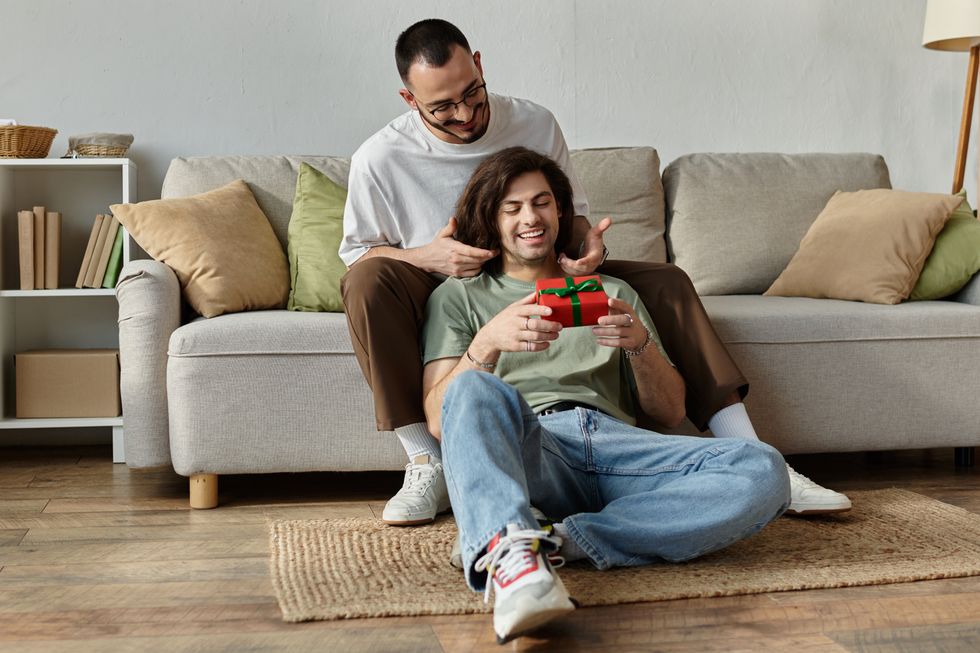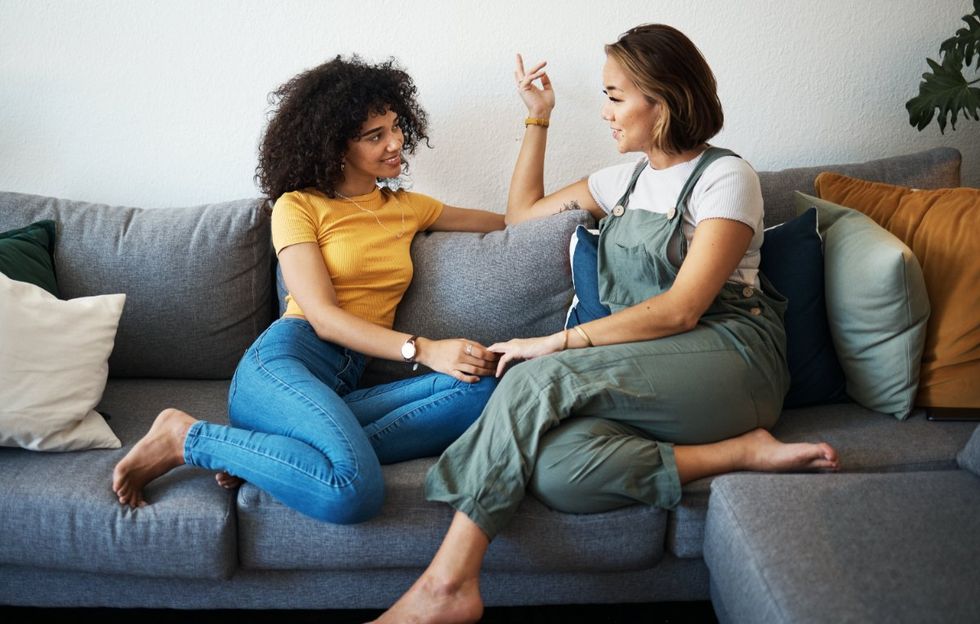Open relationships bring a bunch of significant emotional benefits, as well as more sex with more people. Here are just a few...

Shutterstock
‘Because you both want to’ is the best reason of all, and if neither you or your partner are really into the idea then you probably shouldn’t. But there are actually a whole bunch of advantages to poly and open relationships that aren’t necessarily obvious if you’ve never really been exposed to them, so here are a few things you should possibly consider….
1. It's fun

Shutterstock
Look, gay men are attracted to each other. Even if a guy is "not your type," spend enough time alone together and there's bound to be some sort of sexual chemistry. Opening things up is just fun, and allows you to continue to explore your sexual fantasies.
2. It can feel really daring

Shutterstock
If you grew up around monogamy and the thought of being in an open relationship feels scary, it can also feel really daring to partake in one. It's almost like you're doing something wrong, but you're not. So long as you stay OPEN with your communication about who you're with and when, there's no reason to feel any guilt.
3. It could change things for the better

Shutterstock
Hold on here real fast -- opening your relationship should not be the answer to saving your relationship if things aren't working. This is the straight people version of having a baby, but it's less of a lifelong commitment. Still, if you two are comfortable and confident in your relationship, opening it up can actually make things a lot better.
4. It lessens the likelihood of anyone cheating

Shutterstock
Listen, everybody looks at other people, whether you're in a relationship or not. There are so many people in relationships who feel the slightest offense if their partner thinks someone else is cute. Being in an open relationship is not for everybody, no, but allowing some space to explore with other people, either as a couple or on your own, lessens the likelihood of either partner cheating. Sometimes, sex is nothing but just sex. It's hard to match the emotional complexities that come with being in a relationship, so allowing for some extra play here and there may not be the worst idea.
5. It helps develop a more open line of communication

Shutterstock
This kind of goes hand-in-hand with lessening the likelihood of cheating, but honesty is a really important factor in relationships. When you start to open things up, you really learn how to trust each other, because you're given the freedom to do so. It isn't about not experiencing jealousy, but rather being open about your feelings when something seems a little off or really being able to talk to your partner about issues that bother you.
6.You're not asking one person to meet all of your emotional, sexual, intellectual, and practical needs

Shutterstock
The modern concept of ‘romance’ implicitly demands that one’s partner meets all one’s emotional, sexual and practical needs, but actually that’s one hell of a lot to ask of a single person, particularly over the long haul. The emphasis on an ideal of sustained romantic perfection, being in love and sexually passionate forever, is a relatively recent concept (like, the last few hundred years at most, and for a substantial chunk of those female sexuality was either denied or demonised.) We’ve only been gunning for lifelong romantic relationships with any decent expectation of one party not dying and no extended family networks for the last hundred years, if that. Humans are social animals – most of us need sustained bonds with more than one person to be optimally happy and healthy, however those bonds are expressed.
7. It solves issues of personal, sexual, and social difference

Shutterstock
If one of you is extroverted and sociable and the other introverted (bullshit as those polarities are), or one of you has a much higher sex drive than the other, or there are other marked differences that are difficult to reconcile except to one party’s detriment, opening up your relationship creates room for both people to be happy. The introverted person gets all the alone time they need without worrying they’re depriving their partner, and the sociable or libidinous (sorry, I love that word – ‘horny’ would be a more colloquial way of putting it) person gets all the sex and social time they need without feeling they’re placing unfair demands on their partner. Plus, if one of you is kinky in a particular way the other doesn’t share, opening up your relationship means they get their sexual needs met without having to involve the other person in sexual stuff that isn’t really their bag.
8. It helps relationships last longer (or end if they need to)

Shutterstock
Obviously, if your relationship is fundamentally broken, adding more people is simply going to amplify the drama. (Don’t do this.) But if someone is fantastic and your connection with them is great except for one key thing – differing sex drives, different intellectual interests or levels of understanding, inconvenient geography – opening up the relationship or becoming poly (as long as all parties are happy to do so) means you not only get to keep this fantastic person, but you get to find another fantastic person who fills the gap and is individually awesome in their own right.
9. It can help you both retain a sense of individuality

Shutterstock
Opening up often helps partners to see each other as separate people, with their own tastes in people and practices, and their own exciting ideas, rather than falling into thinking of each other as two halves of the same undifferentiated unit. Plus, if you’re happy for them to see other people but they keep returning to you for love and support, it reinforces the fact that you’re together because your relationship is good and you love one another rather than sticking in it through inerta, lack of option, or fear.
10. Monogamy is pretty much at odds with how human beings grow and change

Shutterstock
Adapting to each other’s individual autonomy, growth and change in various ways is one of the biggest causes of tension and breakups in monogamous relationships. Open or multiple relationships afford much greater space for each person to develop individually without being stymied by needing to fill a particular role in the relationship, and often require a degree of open discussion and negotiation that is very good for the relationship. Over time, individual changes may mean changes in the relationship, but are much less likely to mean ending it.
11. You're less tempted to try and shoehorn anybody into being 'the One' just because you're having sex with them

Shutterstock
If you have other relationship options all the time, you’re much less likely either to end up on the Relationship Escalator by accident or do that thing where the person you’re with is not quite right but you really want them to be so you sort of try and convince yourself that they are and after all they want you so why will your pesky feelings just not quite fit (does this sound like the voice of experience? It’s totally the voice of experience.) Because you can’t make assumptions with open relationships the way you can monogamous ones, it’s much more difficult to let self-deception and that awful thing where you just assume you must want x or they must want x happen, and that makes for relationships much more built around each person’s needs than a standard monogamy model. Even having the discussions about what you want and how you feel about monogamy or open relationships can be really fruitful in terms of relationship insight.
12. Amazing support networks dedicated to one another's wellbeing

Shutterstock
Provided everyone involved really wants to be there, poly and open relationship networks can be sterling sources of love, support and succour through thick and thin. There’s no-one better to discuss your mutual partner with than a metamour (your partner’s other lover), and if you multiply the relationships you multiply the number of people to talk to, offer practical support, do things with, build furniture with, even have kids with if that’s your bag. Again, it’s contingent on everyone involved being happy with the situation – there’s a difference between being nervous or uncertain because it’s your first time trying to have an open or poly relationship, and knowing that you don’t want to be in one.
13. Threesomes (or moresomes) are great

Shutterstock
Probably don’t need to go into too much detail about this one. They ARE great, but usual rules apply for everyone’s sanity – usual rules being a) everyone involved must fancy everyone else (preferably roughly equally), b) everyone must want to do this and be adult enough to have necessary consent and communication conversations and c) have some brief discussion beforehand about what ‘this’ is and where it’s going – are you looking for an ongoing thing? A single night after which the person stays out of non-shared contact with you or your partner? A relationship which each of you can develop independently? Is the new person or new people on the same page with this? Obviously, if you’re poly, you’ll probably have discussed this scenario independently anyway!
14. It's easier to spot and deal with abusive relationships

Shutterstock
If you have happy, healthy relationships for comparison, it’s more difficult for anyone to gaslight you or coerce you into doing things you don’t want to do – or at least, there are more people around to notice, offer you practical and emotional support and help you to leave. Other partners also make it more difficult for abusers to isolate and destabilize you emotionally – if you’re nominally in an ‘open relationship’ and your partner has several other lovers but every person you might develop a relationship with is forbidden for some reason, it is a massive red flag.
15. More different, varied experiences and opportunities for personal growth

Shutterstock
Don’t get me wrong, the emotional work you need to do to take a monogamous relationship over the long haul is definitely one hell of an opportunity for personal growth. But if you’re having open or poly relationships you not only have the self-knowledge inculcated by the process but also that stemming from your individual relationships with all your different partners, each of whom know you in different ways and with whom you have different relationships. You get to know what you need and what belongs to each connection, when to end things and how to carry them on. As an exploration of self and other, poly and open relationships are brilliant – and often involve lots of sex, plenty of hugs and much intelligent discussion as well.











































































